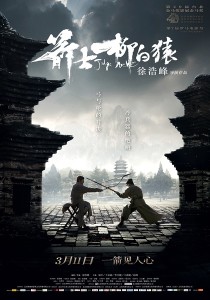Judge Archer
箭士柳白猿
China, 2012, colour, 1.85:1, 90 mins.
Director: Xu Haofeng 徐浩峰.
Rating: 4/10.
Another obscure, academic riff on martial-arts films from the maker of The Sword Identity.
China, the warlord period, 1917. Traumatised by the rape of his elder sister in the countryside, Shuangxi (Song Yang) goes mad and is cared for in a temple. A monk suggests that he starts a new life by adopting the name of the first person he meets in the outside world. This turns out to be an old man who is known as Archer Liu Baiyuan, aka “Judge Archer” – because of his skill with the bow and arrow and in settling disputes between rival martial arts schools. Before dying, Judge Archer spends three years passing on his skills to Shuangxi, who then also adopts his name despite the fact it has been cursed for 16 generations. The new Judge Archer (Song Yang) meets Erdong (Wang Yanni), who asks him to avenge the murder of her father, a member of the revolutionary Tongmenhui, by a warlord, Yang Naixing; Judge Archer agrees to take on the case but rejects Erdong’s sexual advances. He sets himself up as a fruiterer opposite the house of Yang, who is now in exile. Yang’s bodyguard is Kuang Yimin (Yu Chenghui), a veteran, onetime prominent martial artist, whose young wife, opera singer Yue Yahong (Li Chengyuan), gets to know Judge Archer after regularly visiting his fruit shop. Judge Archer becomes enamoured of Yue Yahong, drops Erdong’s case, and plans to elope with Yue Yahong. He then discovers that both Yue Yahong and Erdong have been separately stringing him along, the first under the orders of Kuang Yimin and the second under the orders of Guo Decheng (Zhao Zheng), a former pupil of Kuang Yimin with nefarious plans of his own.
REVIEW
Pretty much every criticism that went for The Sword Identity 倭寇的踪迹 (2011) also goes for the second feature by writer-director Xu Haofeng 徐浩峰, Judge Archer 箭士柳白猿. Xu’s film-making technique shows marginal improvement and the black humour behind the straightfaced displays of martial arts is still present; but there is still an obstinate refusal to let the audience engage in any way with the characters, emotions or even the storyline – all of which are perversely obscure and sap the viewer’s concentration in an exasperating way. In Sword, Xu’s oblique approach to narrative could perhaps be excused as a tyro film-maker’s bravado; repeated in Judge, however, it starts to smack of intellectual arrogance.
Quite simply, without a detailed printed synopsis the film is incomprehensible. The constant ellipses in the script [adapted from Xu’s own short story 柳白猿别传, literally “A Supplementary Biography of Liu Baiyuan”], the shortage of dialogue, the lack of any backgrounding to the characters – all make watching Judge an exhausting process: the mind is more busy trying to work out what is going on than appreciating Xu’s clever riffs on accepted formulae. A novelist and martial artist himself, the polymath Xu still desperately needs a more seasoned collaborator to help him realise his particular vision, as what may well work on the printed page or in his imagination does not necessarily work in the more exacting medium of cinema. The detail of weaponry, the period artifacts, the rituals and rules – they’re all on screen but unexplained and unexploited in cinematic terms.
Judge is all the more frustating as it contains some interesting elements that cry out for clearer exposition: the fault-lines of loyalty in the martial arts code, the way in which martial artists became dinosaurs in the 20th century, their inability to express themeselves except through action, their lack of emotional development, and so on. The title hero (again played by Song Yang 宋洋, the mysterious swordsman in Sword) has adopted the name of a veteran martial artist but not all of his wisdom: he’s progressively hoodwinked by two women (one gawkily played by Chinese-American Wang Yanni 王燕妮 [Yenny Martin], the other more vampily played by TV actress Li Chengyuan 李呈媛) and is more concerned with showing off than actually becoming a sagacious judge. Song shows the same easy charm as in Sword but again gets little chance to develop either the character or humour that lie beneath the movie’s perplexing surface. The same goes equally for other lead players like Yu Chenghui 于承惠 (the veteran in Sword) and TV drama actor Zhao Zheng 赵峥.
Overall, the film is technically more accomplished than Sword and just as playful – especially with its music score, which shifts from delicate fretted music to thunderous organ chords, and often in its fight scenes. Staged by Xu himself, the latter are again brief, only half-glimpsed, and physically contained – sometimes just between two men on chairs sitting face to face. Photography by Wang Tianlin 王天麟 is more warmly lit, and at 90 minutes the movie is much tighter than Sword. But until Xu stops being a one-man band, locked in his own rarified world, his ideas are going to remain just ideas, not blossom as movies.
The Chinese title translates as “Archer Liu Baiyuan”. [Liu Baiyuan (literally, White Ape Liu) is one of many colourful characters in Xu’s 2007 novel Taoist Mountain 道士下山, subsequently filmed as Monk Comes Down the Mountain 道士下山 (2015) by Chen Kaige 陈凯歌 but omitting Liu Baiyuan.]
CREDITS
Presented by Beijing MTM Culture Media (CN).
Script: Xu Haofeng. Short story: Xu Haofeng. Photography: Wang Tianlin. Editing: Xu Haofeng. Music: An Wei, Wang Fan. Art direction: Xie Yong. Costume design: Liang Tingting. Sound: Long Xiaozhu, Zhang Jinyan. Action: Xu Haofeng.
Cast: Song Yang (Shuangxi/Archer Liu Baiyuan/Judge Archer), Yu Chenghui (Kuang Yimin), Li Chengyuan (Yue Yahong), Wang Yanni [Yenny Martin] (Erdong), Zhao Zheng (Guo Decheng), Li Yiming, Li Guisheng, Ma Jun, Hao Yongfeng, Chang Zhongjian, Xie Yong.
Premiere: Rome Film Festival (CinemaXXI), 16 Nov 2012.
Release: China, 11 Mar 2016.
(Review originally published on Film Business Asia, 23 Nov 2012.)
